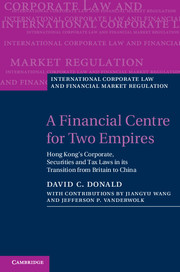 A Financial Centre for Two Empires
A Financial Centre for Two Empires Book contents
- Frontmatter
- Contents
- List of figures
- List of tables
- Preface
- 1 History’s marks on Hong Kong law
- 2 Hong Kong’s economic structure
- 3 Hong Kong corporate and securities laws in response to the Region’s role as China’s international financial centre
- 4 The role of Hong Kong’s tax policies
- 5 Enforcement of corporate and securities law in Hong Kong
- 6 China’s impact on Hong Kong’s position as an international financial centre
- References
- Index
4 - The role of Hong Kong’s tax policies
Published online by Cambridge University Press: 05 June 2014
- Frontmatter
- Contents
- List of figures
- List of tables
- Preface
- 1 History’s marks on Hong Kong law
- 2 Hong Kong’s economic structure
- 3 Hong Kong corporate and securities laws in response to the Region’s role as China’s international financial centre
- 4 The role of Hong Kong’s tax policies
- 5 Enforcement of corporate and securities law in Hong Kong
- 6 China’s impact on Hong Kong’s position as an international financial centre
- References
- Index
Summary
Historical background
Hong Kong’s development as an international business centre has undoubtedly been helped by its low taxes and limited tax base. The ability to set up shop in Hong Kong for the purpose of China-related trading activities, or wider regional trading, without incurring substantial tax costs, has been a significant factor in attracting business to Hong Kong. In the financial services area, investors are able to buy and sell Hong Kong-listed shares free of any income tax in Hong Kong. Unlisted stock can also be sold on a tax-free basis, enabling successful entrepreneurs to dispose of part or all of a Hong Kong business without losing any of the proceeds as a result of taxation. Dividends are not subject to tax in Hong Kong, either. From an income tax perspective, Hong Kong is an investor’s paradise. It has often been described as a tax haven, although the definition of that term is controversial and its applicability to Hong Kong and other populous jurisdictions is debatable.
No income taxes of any kind were imposed in Hong Kong until 1940, when separate taxes on business profits, employee salaries and rental income from real property were introduced under the War Revenue Ordinance 1940. The maximum rate of tax was 10 per cent, and the tax base was limited to income arising in Hong Kong. The same limited system of income taxation has remained in place ever since, with somewhat higher maximum rates (15 per cent for individuals and unincorporated businesses, 16.5 per cent for corporations). No taxes have ever been imposed on investment income such as dividends and capital gains, nor has there been any form of wealth tax since the repeal of estate duty in 2005.
- Type
- Chapter
- Information
- A Financial Centre for Two EmpiresHong Kong's Corporate, Securities and Tax Laws in its Transition from Britain to China, pp. 171 - 187Publisher: Cambridge University PressPrint publication year: 2014
